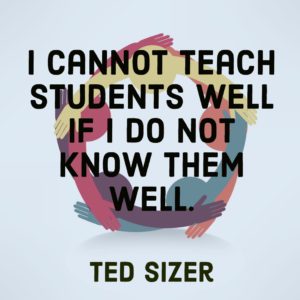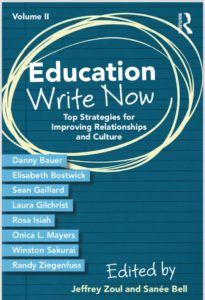 It’s “back to school” time here in the northern hemisphere. For us, teachers returned to classrooms last week and students arrive this coming week.
It’s “back to school” time here in the northern hemisphere. For us, teachers returned to classrooms last week and students arrive this coming week.
The past week was an energizing one! Reconnecting with those I haven’t seen in weeks, learning together once again, sharing plans for the best school year yet, and finding the feeling of re-connection infectious. Lots of, “How was your summer? What did you do? Where did you go?” Listening intently and noticing how each individual has their own preferences for summer learning, relaxation and re-energization.
For me, this was one of the best summers I can recall. I intentionally packed lots of learning opportunities into the month of July, capped by a week “off the grid,” relaxing, thinking, wondering and enjoying the surroundings of a different place.
Part of my July-of-learning was travelling to Chicago to be with a group of passionate educators – most of whom I knew only from social media – to collaboratively write Volume II in the Education Write Now project, Education Write Now: Top Strategies for Improving Relationships and Culture. You may recall last December the release from Routledge of Volume I featuring the perspective of ten authors on the overarching theme of change.
For Volume II, the overarching theme is, as you can tell from the title, relationships. If you follow this blog, it’s no secret that the work in our district is focused on learner-centered education and leadership. One of the ways Lynn, our Assistant Superintendent, and I support our learning in this area is through producing the Shift Your Paradigm podcast. As we’ve shared the 40 episodes online, exploring learner-centered education and learner-centered leadership with practitioners across the country, the topic of relationships has become a common thread for discussion.
Working on this project with the writing team was an opportunity for me to dig into the podcast conversations, uncover some trends and potential new thinking, and tinker with these ideas while deepening connections and relationships with some of my fellow practitioners and writers. The process was a highlight of the summer and an opportunity I am thankful for as it provided new connections and new relationships with a group of passionate educators.
Check out the recent post from the volume editor Jeff Zoul, Strategies for Improving Relationships and Culture, where he shares his thoughts on the collaborative process and an excerpt from his opening chapter.
Relationships. It’s become an education buzzword. And like many buzzwords, overused and losing meaning. For years now, I feel a dissonance inside me whenever educators use the word. I wonder: What is their understanding of the word? What actions stem from their understanding of “relationships”? If we shift our lens from school-centered to learner-centered, does the term “relationships” look different?
 As we’ve produced the podcast over the past 18 months, this last question frequently surfaced for Lynn and me along with interesting ideas from our conversations. For my contribution to Education Write Now, Volume II (Chapter 2: Relationships: The Foundation of Learner-Centered Environments), I first differentiate the two paradigms – school-centered and learner-centered as supported by the work of Education Reimagined. I then follow this opening with the story of our journey to learner-centered education in the Salisbury Township School District.
As we’ve produced the podcast over the past 18 months, this last question frequently surfaced for Lynn and me along with interesting ideas from our conversations. For my contribution to Education Write Now, Volume II (Chapter 2: Relationships: The Foundation of Learner-Centered Environments), I first differentiate the two paradigms – school-centered and learner-centered as supported by the work of Education Reimagined. I then follow this opening with the story of our journey to learner-centered education in the Salisbury Township School District.
The remainder of the chapter explores three questions:
- Why are relationships key in learner-centered environments? (Including the neuroscience behind relationships.)
- What distinguishes relationship in learner-centered environments? (Including five key takeaways from the podcast conversations with various learner-centered school leaders and learners.)
- How do we cultivate deep relationships with learners and others in learner-centered environments? (Including four action steps readers can explore in their own learning environments.)
The excerpt below provides a glimpse into what you will find in the chapter, Relationships: The Foundation of Learner-Centered Environments.
I’ve always loved these words from Education Reimagined::
“Learners are seen and known as wondrous, curious individuals with vast capabilities and limitless potential.” (Education Reimagined, 2015, p. 5.)
They keep me grounded and always thinking about putting learners first, both young and old. In the end, the quality of the relationships we build is dependent on the lens through which we choose to view relationship building – the school-centered lens or the learner-centered lens. Depending on which we use, the relationships will look and feel different. With the school-centered lens, relationships will be transactional, constrained by time and confined to the walls of the classroom or school.
With the learner-centered lens, relationships will always begin with the learner, focusing on conversations that deepen our understanding of people as learners. These relationships are multi-directional and diminish the hierarchy found in traditional teacher-learner relationships. Relationships in a learner-centered environment are less about “knowing about people” and more about using our understanding of the academic, personal and social/emotional passions, interests and needs of others to learn with them and co-design the most powerful environments needed to realize dreams and goals.
How will you take the next steps to create the space for building the deep, lasting relationships today’s learners need?
I am grateful to Jeff Zoul and Routledge for the invitation to participate in the Education Write Now project this year. It provided me the opportunity to tinker with ideas, write them down, and build powerful, sustaining relationships with the writing team: Jeff Zoul, Sanée Bell, Rosa Isiah, Elisabeth Bostwick, Laura Gilchrist, Onica Mayers, Winston Sakurai, Sean Gaillard and Danny Bauer. It was certainly one of the highlights in a summer of learning! Hopefully, the final product will impact the practice of educators seeking to deepen their understanding of relationships.
Next week, look for Rosa’s thoughts on our writing process, as well as an excerpt from her chapter. Rosa writes at http://rosaisiah.blogspot.com. Go bookmark it now! Rosa is a wonderful practitioner, deep thinker and engaging writer. You won’t want to miss what she has to say on the topic of relationships!
Look for Education Write Now, Volume II: Top Strategies for Improving Relationships and Culture to be published in December of this year. And the best part…all proceeds benefit the Will to Live Foundation.
How will you take the next steps to create the space for building the deep, lasting relationships today’s learners and school cultures need?
Connect with Randy on Twitter, the TLTalkRadio podcast, and the Shift Your Paradigm podcast!
Get new content delivered to your inbox and the ebook 3 Key Principles of Digital Transformation. The ebook contains valuable information from my experience leading a digital transformation and working with a variety of stakeholders over the past decade.
- A silver lining - January 22, 2022
- Is our use of tech working against us? 🤔 - September 8, 2021
- What’s NOT going to change in the next 10 years? 🤔 - September 7, 2021